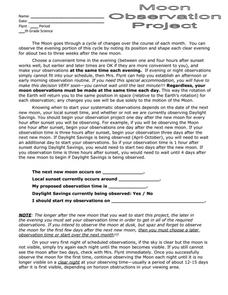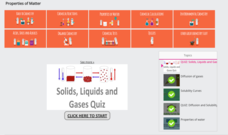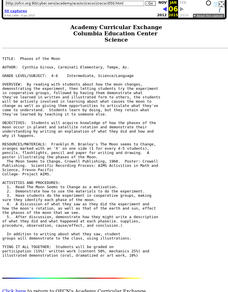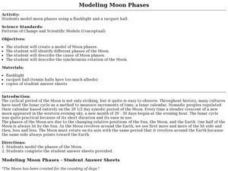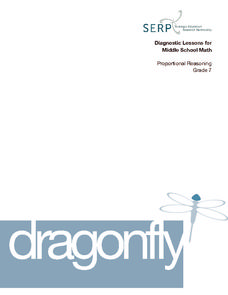Curated OER
States of Matter Lesson
Second graders identify the three phases of matter and demonstrate how a property can change states of matter. In this states of matter instructional activity, 2nd graders make an Ooze to discover how a solid changes into a liquid....
School World
Moon Observation Project
Mrs. Flynt has designed a 12-day moon observation activity that is best assigned when daylight hours are shorter. Middle school moon experts record several factors, including the altitude above the horizon, the azimuth, the phase, and...
Fuse School
Quiz: Solids, Liquids and Gases
Time to show what they know! Module five in a 14-part series about solids, liquids, and gases redirects to an interactive quiz. Learners test their skills on topics such as states of matter, phase changes, and Brownian Motion. With...
NOAA
Water Cycle
Be water wise! Science scholars learn the water cycle on a global scale in part seven of a 13-installment series. The hands-on interactive allows them to explore Earth's water storage, types of precipitation, and the cycling of water...
Curated OER
Phases of Matter
Pupils comprehend the different phases of matter. They give examples of each phase and describe the processes of changing between these phases. Students are asked what is plasma? They are asked what is the four phases of matter? ...
Curated OER
Phases of the Moon: Cooperative Learning
Third graders examine the phases of the moon. In this moon phase lesson, 3rd graders listen to a read aloud of The Moon Seems to Change by Franklyn M. Branley and discuss the phases of the moon. They complete a moon phase calendar and...
Curated OER
Phases of the Moon
Pupils research and identify the phases of the moon. They consider the moon's rotation, as well as that of the earth and sun. They write a description of their research and present it to the class.
Curated OER
Phases of the moon
Third graders name the phases of the moon. For this moon phase lesson, 3rd graders listen to the story The Moon Seems to Change and they discuss the different moon phases. They take oreos and split them apart and look at the cream to see...
Curated OER
The Many Phases of the Moon
Fifth graders explore the phases of the moon as it relates to the calendar.
Curated OER
It's Just a Phase
Young scholars describe the phases of the moon and play a game with moon phase cards.
Curated OER
It's Just a Phase
Sixth graders are introduced to the correct terminology for the phases of the moon and arrange picture cards in the correct order. They use flashlights and Styrofoam balls to illustrate the phases of the moon. They write science journal...
Curated OER
Modeling Moon Phases
Learners identify the phases of the Moon and the synchronous rotation. In this hands on lesson students will create a model of the Moon.
Curated OER
Moon Phases
Middle schoolers engage in a study looking for the differences found during the cycle of one lunar month. They conduct research using a variety of resources. Then the information is used to construct a lunar calendar to observe daily...
Curated OER
Phases of the Moon
For this phases of the moon worksheet, students first fill in and label a graphic organizer showing the moon's phases, then complete 5 fill in the blank sentences.
Curated OER
Student Exploration: Phases of the Moon
In this moon phase worksheet, students complete 2 prior knowledge questions, then use the "Phase of the Moon Gizmo" to complete several activities, answering short answer questions when finished.
Curated OER
Chemical Solutions
For this chemical solutions worksheet, Students determine the significance of the critical point in a phase diagram and rank solutions from weakest to strongest solute-solvent interaction. This worksheet has 4 problems to solve.
Curated OER
Modelling Periodic Phenomena
In this Pre-calculus/Trigonometry worksheet, students determine the trigonometric function that best models the given data. The eight page worksheet contains explanation, examples, and twenty-one problems. Answers are not included.
Curated OER
Chemical and Physical Changes
Eighth graders investigate different gas behaviors. In this chemistry lesson, 8th graders describe how changing volume and temperature affect gas particles motion. They collect data and make a generalization about these variables'...
Curated OER
How Does the Moon Seem to Change?
In this moon instructional activity, students will discover why the moon seems to change in appearance over a month time period. Students will fill in the blanks of 5 statements in this graphic organizer.
Virginia Department of Education
Heat Transfer and Heat Capacity
It's time to increase the heat! Young chemists demonstrate heat transfer and heat capacity in an activity-packed lab, showing the transitions between solid, liquid, and gaseous phases of materials. Individuals plot data as the changes...
Curated OER
Moon Phases
Learners model moon phases and observe how it changes. For this investigative lesson students use a model to demonstrate the different phases of the moon.
Curated OER
Particle Model of Solids, Liquids, and Gases
Display the arrangement of molecules in solids, liquids, and gases. Demonstrate how the addition of heat energy results in greater molecular motion and therefore a change of phase. Give examples of heat conductors and insulators, and...
Curated OER
Dragonfly
The speed of a dragonfly brings math into the real world as your learners collaboratively see the value in calculating unit rates in direct proportion problems. This six-phase lesson encourages you, as the teacher, to only ask questions...
Concord Consortium
Boiling Point of Polar and Non-Polar Substances
Go to extremes to illustrate boiling point! Junior chemists explore the effects of heating and cooling on polar and non-polar substances. The interactive allows users to raise and lower the temperature, set specific temperatures, and...
Other popular searches
- Phase Changes of Matter
- Phase Changes in Matter
- Phase Changes in Water
- Chemistry Phase Changes
- Phase Changes of Water
- Water Phase Changes
- Phase Changes Matter
- Lessons on Phase Changes
- Identify Phase Changes



